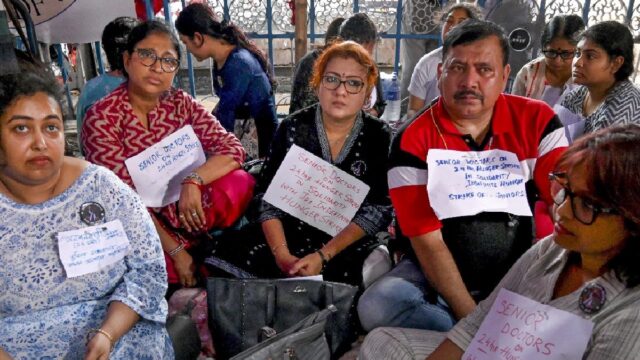The recent events at government hospitals in West Bengal, triggered by the tragic death of a junior doctor, have brought to the forefront the concerns of healthcare professionals regarding workplace safety and their demands for justice. This situation has seen senior doctors express their solidarity with their junior colleagues through “mass resignations,” raising questions about the legality of these actions and the government’s response. This analysis examines the intricacies of this situation and its implications.
Mass Resignation Letters: A Symbolic Gesture or Legal Action?
The mass resignations submitted by senior doctors in West Bengal are not individual resignations as required by service rules, but rather collective expressions of solidarity. The West Bengal government has stated that these generic letters, lacking individual signatures and details, do not hold legal weight.
Government’s Stance: Service Rules and Individual Responsibility
The government insists that the submission of resignation must follow established service rules, requiring individual submissions and detailed information. They perceive these collective letters as symbolic gestures lacking legal significance. This stance emphasizes the individual nature of resignation as a contractual agreement between the employer and employee, rather than a collective action.
Doctors’ Perspective: Symbolic Solidarity and Justice
Despite the government’s perspective, senior doctors have clarified that these letters are indeed symbolic gestures intended to show solidarity with their junior colleagues. They underscore the deeply rooted concern about workplace safety and the pursuit of justice for the deceased doctor. This symbolic action aims to amplify the doctors’ demands for change within the healthcare system.
Navigating the Legal Labyrinth: Resignation as a Contractual Matter
The legal aspect of resignation is a complex issue, with varying interpretations and perspectives.
Contractual Obligation: Employer-Employee Relationship
Resignation is considered a legal action that terminates a contractual agreement between an employee and an employer. This agreement is governed by specific service rules that govern the conditions of employment.
Validity of Mass Resignations: Legal Uncertainty
The validity of mass resignations, particularly those expressed collectively without individual details, is legally ambiguous. While the government views them as lacking legal validity, legal experts highlight the potential legal challenges of enforcing such a stance.
The Importance of Individual Submissions: Ensuring Legal Validity
To ensure legal validity, individual resignation letters adhering to the specified service rules are crucial. This approach allows for clear documentation and identification of each employee’s intention to resign, avoiding ambiguities and facilitating a smooth transition.
Balancing Justice and Order: The Importance of Dialogue and Negotiation
The situation in West Bengal demands a balanced approach that prioritizes justice for the victim, improves workplace safety, and maintains the efficient delivery of healthcare services.
Addressing Doctor’s Concerns: Prioritizing Workplace Safety and Security
The junior doctors’ demands for enhanced workplace security and accountability for the tragic incident are crucial. Addressing these concerns is not only a moral imperative but also essential to maintaining trust and creating a safer environment for medical professionals.
Collaborative Solutions: Facilitating Dialogue and Compromise
Open dialogue between the doctors, the government, and other stakeholders is necessary to find collaborative solutions. Compromise and shared responsibility are essential for navigating this complex issue.
Avoiding Disruptions: Ensuring Continuity of Healthcare Services
While demonstrating their concerns through collective action, doctors are cognizant of their responsibilities to provide essential healthcare services. This highlights the need to prioritize maintaining the stability of the healthcare system while addressing concerns and demanding accountability.
Take Away Points: Navigating Complexity and Ensuring Fairness
The events in West Bengal shed light on the delicate balance between individual rights, legal requirements, and collective action.
- Collective Action and Individual Responsibility: The situation underscores the complex relationship between individual responsibilities and the right to collective action within a legal framework.
- Workplace Safety: A Shared Responsibility: Prioritizing workplace safety for healthcare professionals is not just an issue of individual protection but a shared responsibility that involves the government, healthcare institutions, and other stakeholders.
- ** Dialogue and Collaboration:** Open dialogue, transparency, and a collaborative approach are essential for navigating complex issues involving healthcare professionals and addressing their concerns.
- ** Maintaining Essential Services:** The need to maintain healthcare services during a time of unrest necessitates prioritizing the provision of healthcare while addressing the concerns of doctors.
The West Bengal government, doctors, and other relevant parties must work together to ensure a fair and just outcome that addresses the tragic events and safeguards the interests of all stakeholders.
Disclaimer : इस न्यूज़ पोर्टल को बेहतर बनाने में सहायता करें और किसी खबर या अंश मे कोई गलती हो या सूचना / तथ्य में कोई कमी हो अथवा कोई कॉपीराइट आपत्ति हो तो वह jansandeshonline@gmail.com पर सूचित करें। साथ ही साथ पूरी जानकारी तथ्य के साथ दें। जिससे आलेख को सही किया जा सके या हटाया जा सके ।














